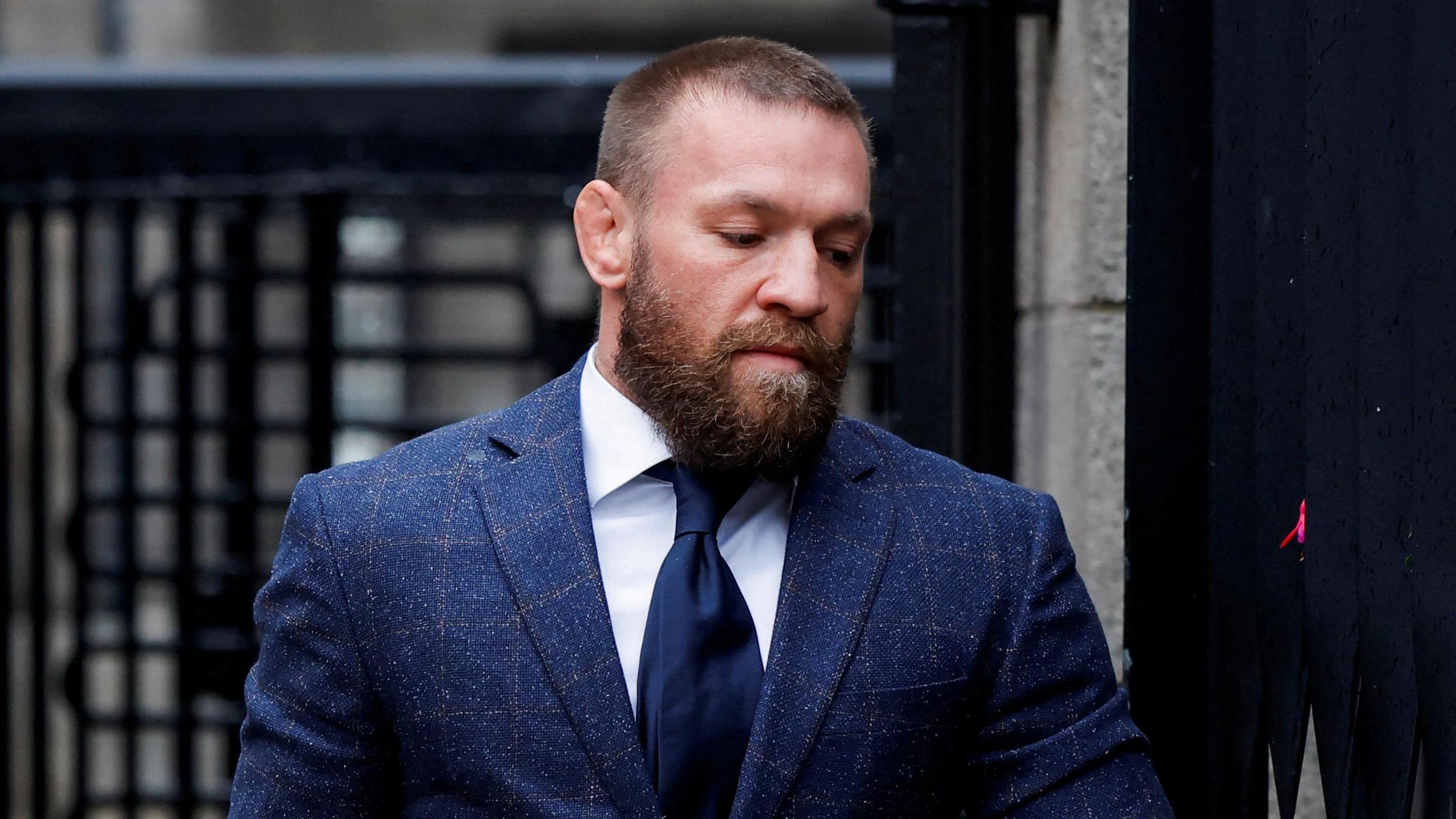'People want nothing to do with him': How Ireland turned away from Conor McGregor
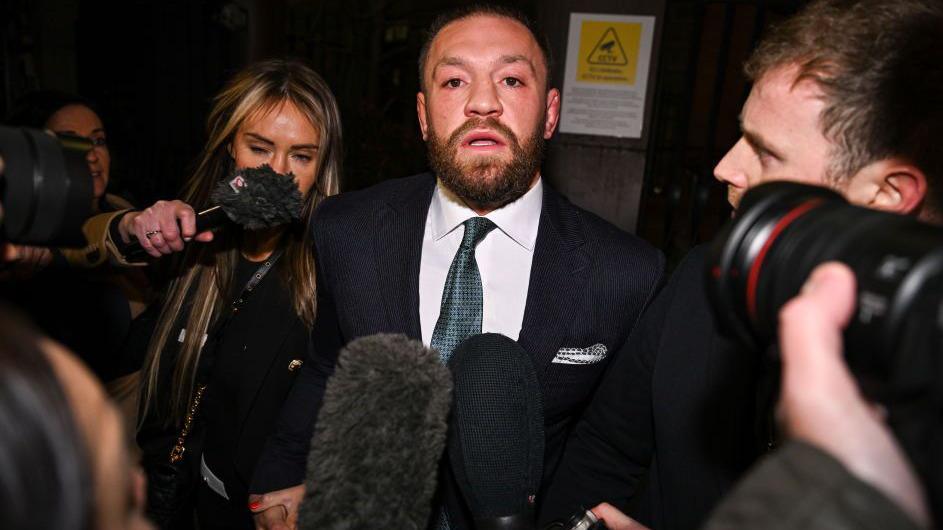
Conor McGregor leaving court after a civil jury found him guilty of sexual assault
- Published
“The fight game awaits!” Conor McGregor proclaimed to his millions of social media followers on Tuesday, while retailers pulled products linked to him from shelves, murals of him were erased and brands announced they had cut ties.
It followed a 12-person jury in Dublin finding McGregor guilty of sexual assault in a civil case brought by Nikita Hand, who accused him of raping her at a Dublin hotel in December 2018. She was awarded nearly €250,000 (£208,000) in damages. In a social media post, McGregor said he would appeal the decision.
Ms Hand’s case was one of several legal issues and controversies that McGregor, one of Ireland’s most famous athletes, has faced over the past few years.
In 2018, he was arrested in New York for throwing a metal dolly at the window of a bus which had a group of Ultimate Fighting Championship (UFC) staff and athletes on board. A year later, he was convicted and fined €1,000 (£850) for punching a man who rejected his offer of a drink in a Dublin pub.
Some commentators argue that support for McGregor within Ireland, where he had been thought of as a trailblazer, has been dwindling for some time - but the shift after Ms Hand’s civil case was seismic.
Within a week, hundreds of supermarkets in both the UK and Ireland removed brands associated with him. Proximo Spirits, the company that bought McGregor’s Proper No Twelve whiskey brand in 2021, said it did not plan to use his name or likeness in its marketing going forward.
IO Interactive, the creators of the Hitman video game, said it would cease its collaboration with McGregor in light of the court ruling. Ireland’s National Wax Museum also said it removed its figure of McGregor two weeks ago.
He built his brand on his patriotism and brash persona. But the controversies surrounding him have turned some former supporters against him and become an increasing distraction from his career.
Petesy Carroll, a mixed martial arts (MMA) journalist, credits McGregor and his team for bringing MMA to Ireland, but says they have "also destroyed it as a sport here".
Now, after the civil case, it’s unclear what comes next.
A divisive figure
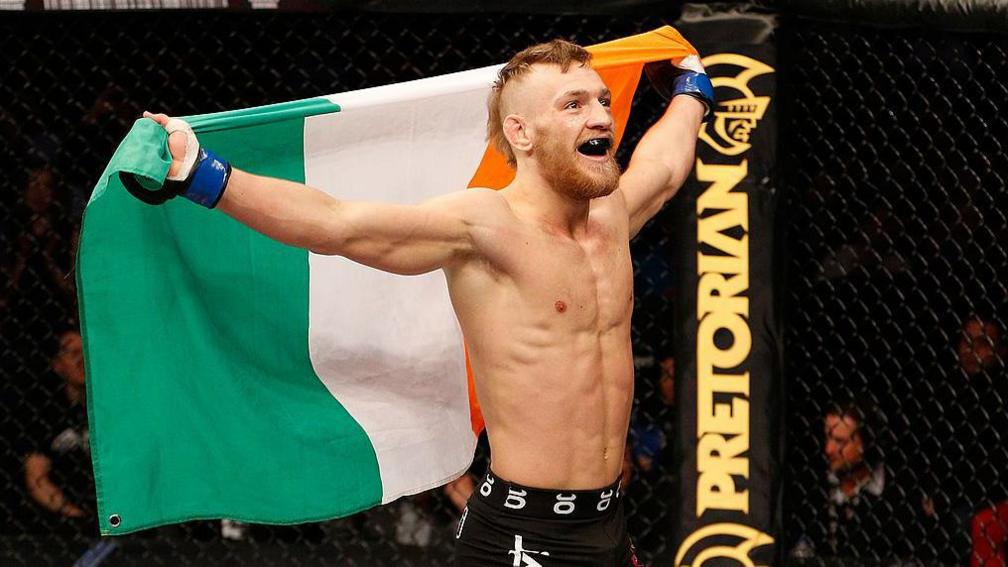
McGregor made his UFC debut in 2013
McGregor’s rise to sporting stardom has often been described as a rags-to-riches tale. As a teenager, living in Lucan, Dublin, he quit his job as an apprentice plumber to pursue a career in a sport that was relatively unknown in Ireland.
“The Irish mentality is when you’re finished school, if you’re not going to college or anything you need to get a job straight away. There’s no chasing your dreams,” he said in a 2013 interview with RTÉ’s Late Late Show, where he was 24 years old and almost unrecognisable.
The brash, confident, boisterous traits his "notorious" brand is now synonymous with were untraceable.
“I thought I could do something with my life. I knew I had the ability to make it in this game,” he said.
Carroll, who has been covering McGregor since the beginning of his career, says McGregor burst on to the mainstream at a time when Ireland was grappling with the impact of the 2008 recession.
“There are no opportunities, everybody’s leaving for Australia or Canada, and here’s this guy saying ‘No, be proud to be Irish. It’s cool to be Irish,'” Carroll says.
"I used to think this guy, it’s great, he’s the same age as me, I’m a college graduate, I’ve walked out of college into a country that cannot afford me any opportunity, and here’s this guy blazing a trail."
McGregor made his UFC debut in Stockholm in 2013, aged 25, defeating Marcus Brimage and winning a knockout of the night award, which came with a $60,000 bonus. In a press conference after the event, McGregor said it was the best moment of his career yet.
“I didn’t have money before this,” he said, “I was collecting €188-a-week off the social welfare, and now here I am with a 60 G’s bonus and then my own pay.”
Carroll says money changed McGregor’s life “to the point that everyone stopped treating him like a human”.
“Everyone panders to him,” he adds.
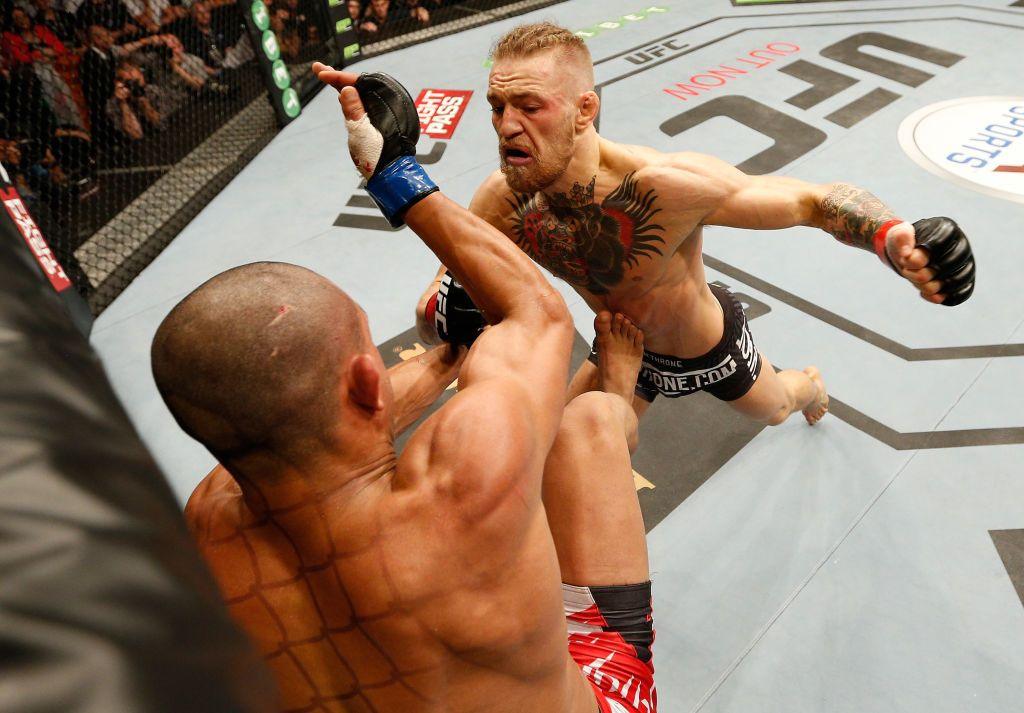
McGregor, pictured here in a 2014 bout in Dublin, did not lose a fight in his first few years in the UFC
In 2015, McGregor beat Chad Mendes in the interim featherweight championship. The bout attracted a sold-out crowd of more than 16,000 at an arena in Las Vegas.
“People don’t give him credit,” Luke Keeler, a professional boxer from Dublin, says of the win. “It was a huge impact that he made. He was dedicated and had great belief at the time.”
By then, it was clear his fame - and bank account - was reaching new heights.
One of the biggest moments in his career came later that year, when he defeated José Aldo to win the featherweight title. His first loss was against Nate Diaz in 2016. A rematch a few months later, which McGregor won, sold a record-breaking 1.6 million pay-per-view buys.
That year, on the US chat show Jimmy Kimmel Live, McGregor was asked at what age he realised he was good at fighting. “I’m Irish, we’re all good at fighting,” he told Kimmel. “Where I come from, where I grew up, you had to be aware, you had to be able to defend yourself, so that’s how I got into it.”
Back on home soil, McGregor was named Sportsperson of the Year at the RTÉ Sport Awards. Sinéad O’Carroll, an Irish journalist and editor who covered the recent trial, says this was seen as a “remarkable feat” as it happened in the same year as the Olympics and Ireland’s Euro 2016 victory over Italy.
“It was divisive though," she adds. “Some people thought that he wasn’t so much a sportsperson, that he was more a celebrity and people looked up to him because of his attitude and his fame.
“He’s never been a very clear-cut, popular figure in Ireland, but he would have been part of that establishment, winning that award, being invited onto the Late Late Show and would have been highly regarded for his feats in the cage, if nothing else,” she says.
Carroll, the MMA journalist, says it was around this time McGregor "started showing everyone who he was".
"It was kind of like one of those moments when you're like, 'oh, he is what we think he is'."
'Lost the run of himself'
His next bout was with Eddie Alvarez, beating him to become the first fighter in MMA history to hold belts in two weight divisions simultaneously.
McGregor stepped away from the UFC in 2017, spending much of that year campaigning for a boxing match with Floyd Mayweather. He fought Mayweather in August of that year, having faced accusations of racism during the promotional tour, which McGregor rejected. Mayweather stopped him in the 10th round.
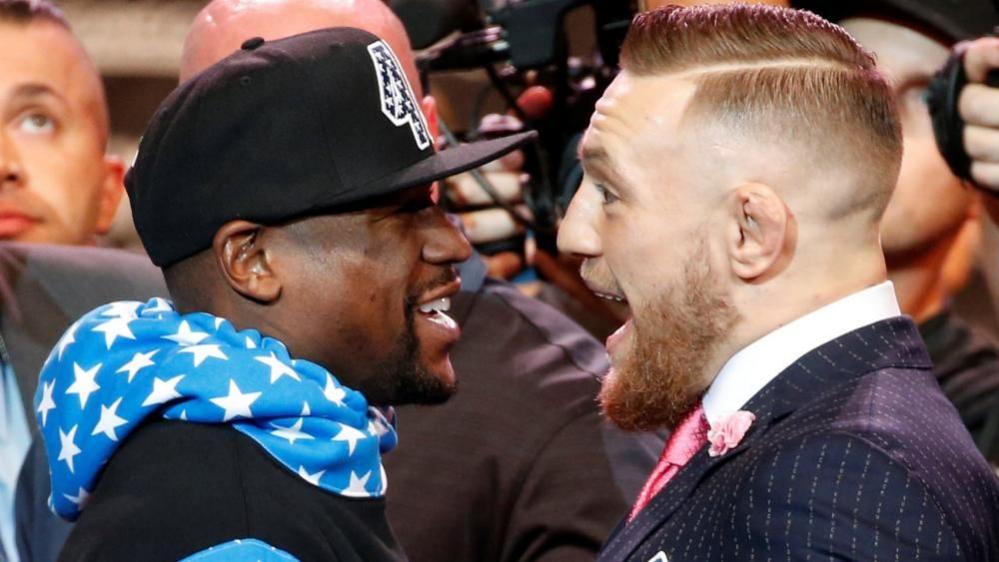
McGregor's fight with Mayweather was a massive sporting event watched around the world
Ms O'Carroll says some people did not like the antics in the lead up to the fight or the mixing of genres from MMA to boxing.
“But he still would have had a huge support base, and I remember that fight. It was in the middle of the night, but huge numbers of people would have gotten up in the morning to watch it and it would have been headline news,” she adds.
Carroll says the Mayweather fight marked a change in McGregor's behaviour.
"He became an icon and he earned so much money, I don't think he had to be as invested," he says. "He became a spectacle."
McGregor returned to the Octagon in October 2018 - two months before the night when a jury found he had assaulted Ms Hand - and lost to Khabib Nurmagomedov.
He has not fought since 2021, but in a statement on Tuesday, he indicated that he was preparing for his return.
"It was amazing what he’d done [in sport]," says Keeler, the boxer.
"But he lost the run of himself... I don’t think he had any role models or anyone he was willing to listen to. I think that was his downfall. No one could actually tell him to cop on.”
BBC News has approached McGregor for comment for this story.
'Relief' over verdict
Ms Hand, a 35-year-old hair colourist, made a statement to Irish police in early 2019 alleging McGregor had raped her. After an investigation into the claim, police referred the case to Ireland's Director of Public Prosecutions (DPP).
Irish media reported on the allegations without naming McGregor, but news reports revealing him as the suspect emerged in the US a few months later. The DPP decided not to criminally prosecute McGregor due to insufficient evidence.
Ms Hand then took civil action against McGregor, suing him for damages for assault. Her lawsuit also alleged that McGregor’s friend, James Lawrence, assaulted her by having sex with her without her consent.
The jury found she had been assaulted by McGregor, but not by Mr Lawrence.
McEntee commends Nikita Hand over McGregor case
- Published23 November 2024
Rape helpline calls almost doubled after McGregor case
- Published26 November 2024
Dr Daniel Kane, a gynaecologist and forensic examiner, told the court how he had to use forceps to remove a tampon Ms Hand said she had been wearing on the night of the assault, which had been “wedged inside”. A paramedic who examined Ms Hand on the day after the alleged attacks said she had not seen a patient as bruised as Ms Hand was in a long time.
McGregor said he and Ms Hand had athletic but consensual sex.
The Dublin Rape Crisis Centre (DRCC) says calls over the six hours after the verdict was delivered surged by 150%.
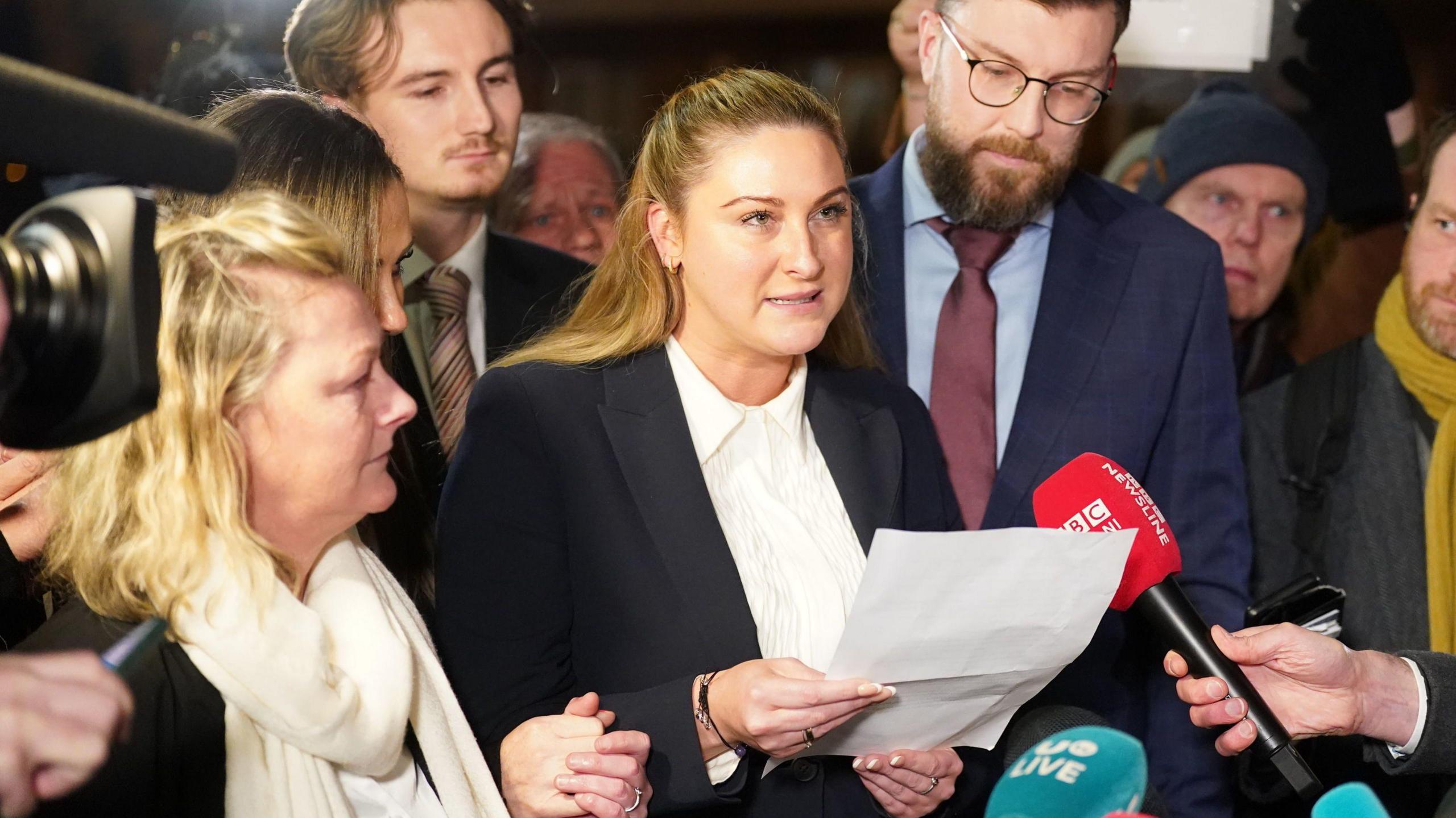
Speaking outside court, Ms Hand encouraged sexual assault victims to "keep on fighting for justice"
Rachel Morrogh, DRCC’s chief executive, says that given the case involved McGregor, an international celebrity, interest was high and news reporting within Ireland was “slightly different”.
“There was rolling news coverage, live updates from the court, and it was the most read news items in many of our national media platforms,” she says.
“It meant that the survivors and victims of sexual violence couldn’t really avoid this news - it was everywhere.
"That includes across social media as well, and on social media people were giving their own views and interpretations of what was happening in court. That was difficult for people that we work with.”
Many people called to congratulate Ms Hand, she says, adding: “Many of them were just expressing relief at the verdict, and others were calling because they were either considering taking a legal case or were in the middle of one themselves.”
After the trial concluded, journalists swarmed around Ms Hand as she made a statement outside the courthouse. She fought back tears as she spoke, but her voice grew stronger as she told journalists she hoped her story would encourage all sexual assault victims to speak up, “no matter how afraid you might be”.
“You have a voice, keep on fighting for justice,” she said.
Ms Hand's case has challenged perceptions in Ireland around how sexual assault victims should behave, Carroll says.
"We're having much more nuanced conversations, I feel, in Ireland about this. It honestly feels like a cultural milestone."
Now, a gym in Corrandulla, Galway, paints over a mural imprinted on its walls since 2016 depicting McGregor, the Irish tricolour behind him, with his fists punching the air.
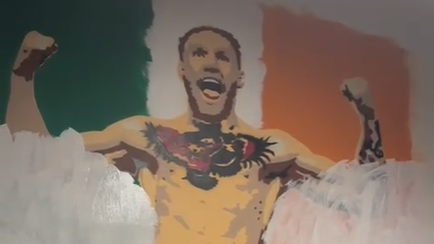
A gym in Galway painted over a mural of McGregor
“With the court ruling last week, I was actually in the car driving and it came on the radio and I straight away just rang a couple of my staff and was like ‘okay, we have to take that down,’" Gary Scully, the owner of Scully Fitness, says.
A video of Mr Scully’s staff brushing white paint over the artwork went viral. He says the response has mostly been positive, but some disagreed with the move.
“Some of them are like, ‘Typical Irish, build someone up and the second they have a wobble, knock them down.' But I think the case and the ruling was a bit more than a wobble,” he says.
He says McGregor is “no longer a role model to the general public” after the ruling.
“People want nothing to do with him, they don’t want to see him, they don’t want anything to do with putting money his way. The way he’s behaved is just absolutely terrible,” Mr Scully says.
“He feels like he’s above the law, and now it’s proved he isn’t.”
Related topics
- Published23 November 2024
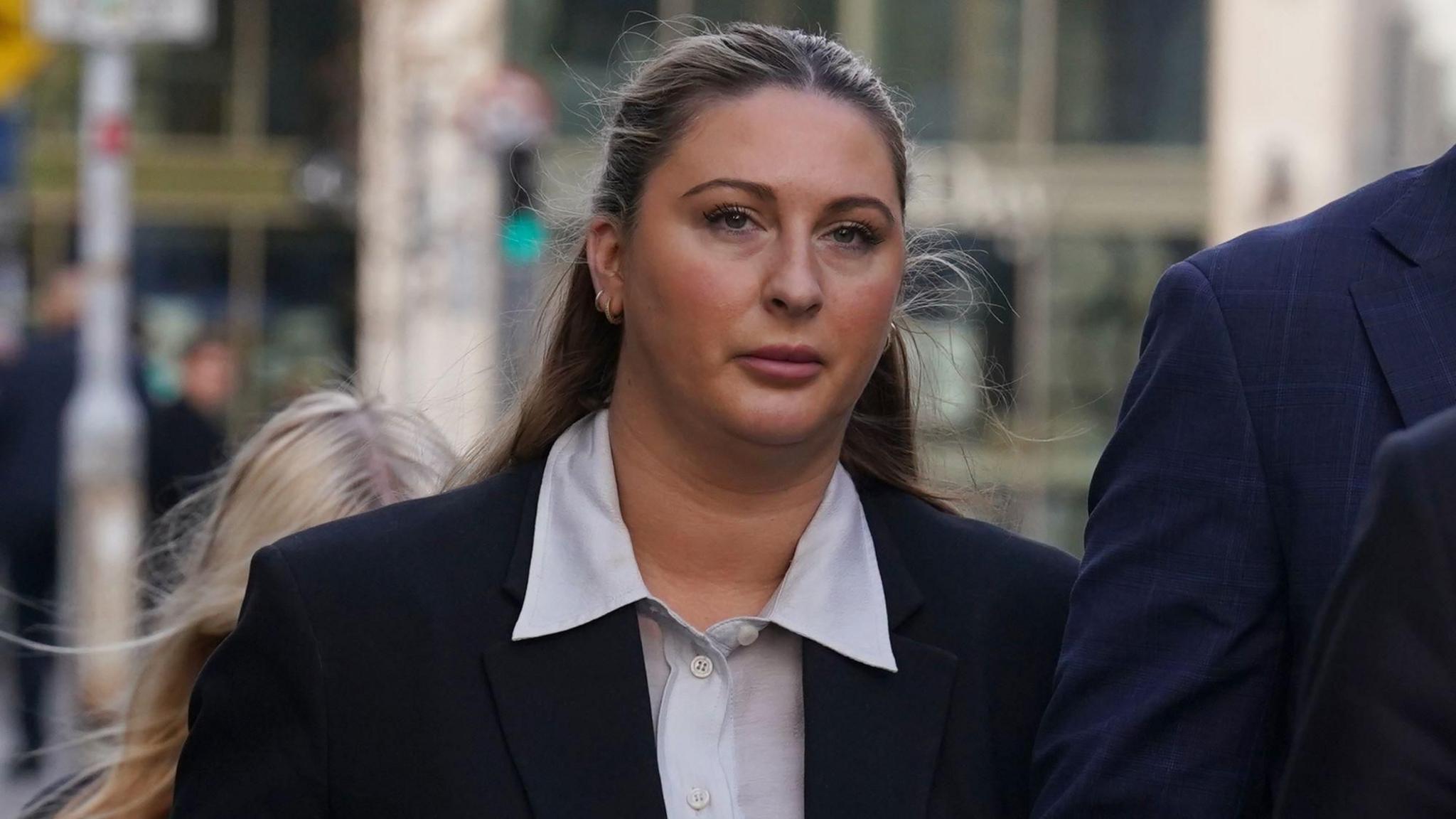
- Published23 November 2024
